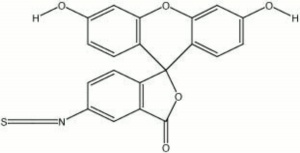Difference between revisions of "Fluorescein isothiocyanate"
Jump to navigation
Jump to search
(username removed) |
|||
| (4 intermediate revisions by 3 users not shown) | |||
| Line 1: | Line 1: | ||
== Description == | == Description == | ||
| − | A [ | + | A [[fluorescent dye]] used to detect [[protein|proteins]]. Fluorescein isothiocyanate (FITC) is used in biochemistry for the detection of pathogens. It has also been used to detect proteins in paint cross sections (Wolbers et al 1990). However, one study has shown that FITC can also fluoresce with [[oil]] and [[acrylic resin|acrylic]] media (Messinger 1992). FITC is sometimes incorrectly called [[fluorescein]]. |
== Synonyms and Related Terms == | == Synonyms and Related Terms == | ||
| Line 9: | Line 9: | ||
[[[SliderGallery rightalign|fluorescein isothiocyanate.jpg~Chemical structure]]] | [[[SliderGallery rightalign|fluorescein isothiocyanate.jpg~Chemical structure]]] | ||
| − | == | + | == Risks == |
| − | + | * Skin contact causes irritation. | |
| + | * Fisher Scientific: [https://fscimage.fishersci.com/msds/97111.htm MSDS] | ||
| − | + | ==Physical and Chemical Properties== | |
| − | Maximum emission wavelength = 520 nm | + | * Soluble in water, dimethyl formamide, dimethyl sulfoxide. |
| + | * Maximum absorption wavelength = 490 nm | ||
| + | * Maximum emission wavelength = 520 nm | ||
{| class="wikitable" | {| class="wikitable" | ||
| Line 26: | Line 29: | ||
|- | |- | ||
! scope="row"| Melting Point | ! scope="row"| Melting Point | ||
| − | | >360 | + | | >360 C |
|- | |- | ||
! scope="row"| Molecular Weight | ! scope="row"| Molecular Weight | ||
| Line 32: | Line 35: | ||
|} | |} | ||
| − | == | + | ==Resources and Citations== |
| − | + | * J.Messinger, "Ultraviolet-Fluorescence Microscopy of Paint Cross Sections: Cycloheptaamylose-Dansyl Chloride Complex as a Protein-Selective Stain" JAIC 31:267-74, 1992. | |
| − | + | * Richard C. Wolbers, Nanette T. Sterman, Chris Stavroudis, ''Notes for Workshop on New Methods in the Cleaning of Paintings'', J.Paul Getty Trust, Los Angeles, 1990 Comment: mean excitation wavelength = 490 nm -blue and mean emission wavelength = 525 nm | |
| − | |||
| − | |||
| − | |||
| − | |||
| − | |||
| − | |||
| − | |||
| − | * | ||
* Aldrich Chemical Catalog Comment: p. 725 - max=499 | * Aldrich Chemical Catalog Comment: p. 725 - max=499 | ||
| − | * Website | + | * Website: www.mdyn.com/application_notes/technotes - gives max abs =490 and max emission = 520 |
| − | * Website | + | * Website: pingu.salk.edu/fcm/fluo.html - gives excitation and emisson as 495, 519 |
| − | * Website | + | * Website: www.probes.com/handbook/sections - gives abs and emission as 494, 518 |
[[Category:Materials database]] | [[Category:Materials database]] | ||
Latest revision as of 10:13, 25 July 2022
Description
A Fluorescent dye used to detect proteins. Fluorescein isothiocyanate (FITC) is used in biochemistry for the detection of pathogens. It has also been used to detect proteins in paint cross sections (Wolbers et al 1990). However, one study has shown that FITC can also fluoresce with Oil and acrylic media (Messinger 1992). FITC is sometimes incorrectly called Fluorescein.
Synonyms and Related Terms
FITC; 5-FITC; 2-(6-hydroxy-3-oxo-(3H)-xanthene-9-yl)-5-isothiocyanato benzoic acid
Risks
- Skin contact causes irritation.
- Fisher Scientific: MSDS
Physical and Chemical Properties
- Soluble in water, dimethyl formamide, dimethyl sulfoxide.
- Maximum absorption wavelength = 490 nm
- Maximum emission wavelength = 520 nm
| Composition | C21H11NO5S |
|---|---|
| CAS | 3326-32-7 |
| Melting Point | >360 C |
| Molecular Weight | mol. wt. = 389.38 |
Resources and Citations
- J.Messinger, "Ultraviolet-Fluorescence Microscopy of Paint Cross Sections: Cycloheptaamylose-Dansyl Chloride Complex as a Protein-Selective Stain" JAIC 31:267-74, 1992.
- Richard C. Wolbers, Nanette T. Sterman, Chris Stavroudis, Notes for Workshop on New Methods in the Cleaning of Paintings, J.Paul Getty Trust, Los Angeles, 1990 Comment: mean excitation wavelength = 490 nm -blue and mean emission wavelength = 525 nm
- Aldrich Chemical Catalog Comment: p. 725 - max=499
- Website: www.mdyn.com/application_notes/technotes - gives max abs =490 and max emission = 520
- Website: pingu.salk.edu/fcm/fluo.html - gives excitation and emisson as 495, 519
- Website: www.probes.com/handbook/sections - gives abs and emission as 494, 518
